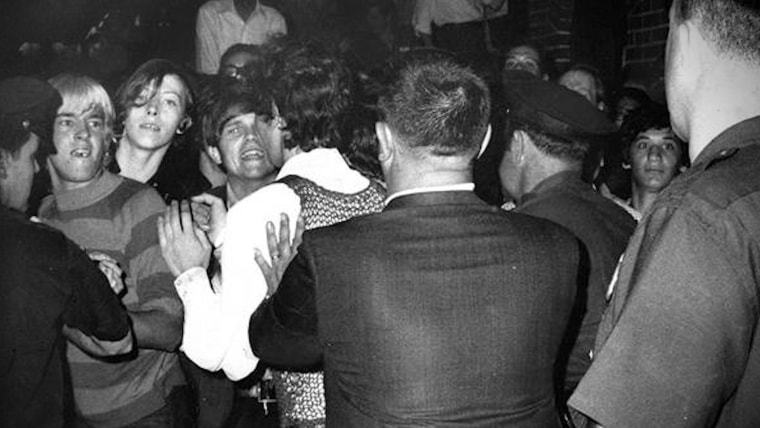They fought for gay marriage. A decade later, advocates reflect on the ‘herculean feat.’
Today, 70 percent of Americans support same-sex marriage. But on June 24, 2011, when the New York Legislature passed the state’s marriage equality measure, only 46 percent did, barely surpassing the 45 percent who opposed the right of gay couples to wed.
Five years earlier, in 2006, the New York Court of Appeals had determined the state constitution did not guarantee same-sex couples the right to marry. That left advocates with only a legislative remedy.
Failed attempts to pass marriage equality measures in 2007 and 2009, however, left supporters deflated.
Christine Quinn, an out lesbian who served as speaker of the New York City Council during both attempts, said the 2009 defeat in the state Senate felt “like the rug had been pulled out from under us.”
“It was so personally painful and so, really not to be dramatic, but devastating,” Quinn said. “And it gave strength to the other side. New York is seen as a progressive state … so us not having marriage equality, it made a great excuse for other states not to do it.”
Then came 2011: Democratic Gov. Andrew Cuomo was sworn into office in January after making same-sex marriage a key plank in his campaign.
“Previously, we had Gov. [Eliot] Spitzer, and he kind of crashed and burned. Then we had Gov. [David] Paterson, and he had no political juice,” Assembly Member Daniel O’Donnell, who introduced five marriage bills over four years, said. “Then we get Cuomo: Here was a guy who was willing to make marriage a priority.”
Cuomo had first publicly supported same-sex marriage when he successfully ran for attorney general in 2006.
“I don’t want to be the governor who just fights for marriage equality,” he told attendees at an Empire State Pride Agenda dinner in fall 2010, the Observer reported then. “I want to be the governor who signs the law that makes equality a reality in the state of New York. And we’re going to get that done together.”
Attempting a ‘herculean feat’
On Jan. 5, 2011, in his first State of the State address, Cuomo promised same-sex marriage legislation would pass that year. With that mandate, activists got to work: The Human Rights Campaign, the nation’s largest LGBTQ advocacy group, partnered with Freedom to Marry, a national organization, and Empire State Pride Agenda, a statewide LGBTQ group, to form New Yorkers United for Marriage, an umbrella group laser-focused on getting legislation passed. They targeted regions across the state, from the Hudson Valley to the Capital Region, to garner support from constituents.
“We built this huge campaign over time, over six months,” David Contreras Turley, then-associate regional field director at HRC, told City and State New York in 2019. “We ended up harnessing about 125,000 constituent contacts for what I know is one of the largest grassroots campaigns in terms of numbers, especially in the LGBT civil rights movement.”
The time was right, but advocates knew they had to strategize differently. Not only had they lost in New York in 2009, but that same year a same-sex marriage bill signed into law in Maine was overturned in a voter referendum.
“We had the opposite of momentum,” said Brian Ellner, who left then-Mayor Michael Bloomberg’s office in 2011 to help lead New Yorkers for Marriage Equality. “No one thought that we could get it done with a Senate that was controlled by Republicans. They didn’t even think the Senate majority leader would bring it to a vote. And we needed to find four Republican yeses, two years after we lost in a Senate that was controlled by Democrats? It was quite a herculean feat.”
For O’Donnell, one of six openly LGBTQ lawmakers serving in the state Legislature at the time, the way to win was to make it more personal: Previously, he said, state Sen. Tom Duane, Assembly Member Deborah Glick and other gay legislators had kept their partners out of politics.
“I knew that that wasn’t going to work,” O’Donnell said. “If I wanted my colleagues to see John and I as part of a couple that deserves equal rights, I had to show them my relationship.”
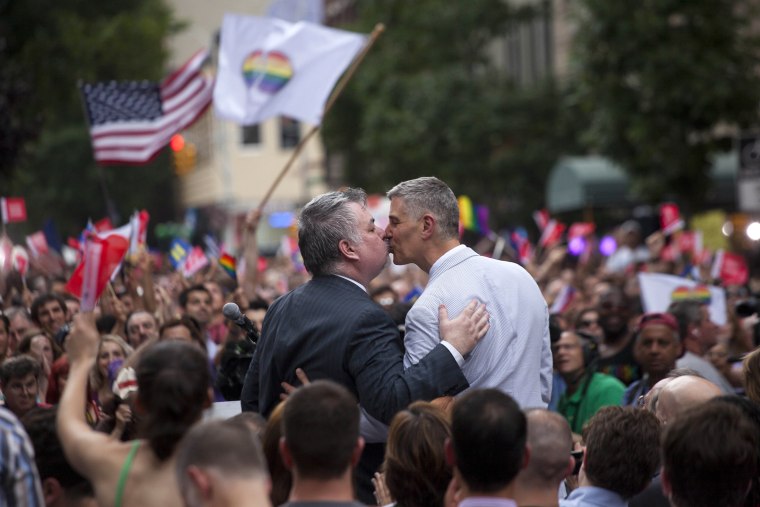
O’Donnell and his now-husband, John Banta, met on the first day of classes at Catholic University in 1978 and began dating two years later.
“I brought John around to a much greater degree than my colleagues had,” he recalled. Banta, the director of special events for the Metropolitan Opera, was a name on his own, and the pair made something of a power couple in Albany.
“It didn’t hurt that he was tall, thin and good looking,” O’Donnell joked. “But, more importantly, he was there, and people saw it as voting against us, rather than just voting against an issue.”
Duane also decided to start bringing his then-partner to Albany more often.
Preaching to the unconverted
They worked diligently to garner Republican support because they didn’t want marriage equality to become a party-line issue, “even though in my heart I knew it clearly was going to be,” O’Donnell said. He also sent weekly letters to his colleagues, with appeals coming from many different angles.
“One might be a poll, one was a letter from a California state senator who went from a ‘no’ to a ‘yes’ and got re-elected anyway,” he recalled. “One was a letter from Mildred Loving — who was, of course, the plaintiff in Loving v. Virginia, which took down anti-miscegenation laws at the Supreme Court — saying this is the same thing. We went around and around pivoting from the moral issue, to the legal issue, to the political issue, to try to give people enough cover to feel that they could vote for it.”
At the end of each letter, O’Donnell wrote, “John and I thank you for taking the time to consider this.”
For Ellner, a new approach meant reaching a new audience and changing the message.
“We couldn’t just talk in an echo chamber if we wanted to convert people to the cause,” he said. “At the time, support for marriage equality was barely at 50 percent in New York, I think, and we really wanted to get it to a majority, if not supermajority, before the vote.”
On March 9, 2011, Cuomo held a meeting with legislators, lobbyists and other major players inside the Capitol’s Red Room. After the disastrous 2009 vote, he wanted to be certain they weren’t working at cross purposes.
“He called a bunch of us to Albany to have a meeting about all of us who were working to get this done, to make sure we were aligned and coordinated,” Ellner recalled. “He made it very clear that this was a very, very high priority for him, if not his top priority that session. I don’t think he could have leaned in any harder to use all of his popularity and his influence.”
What many people don’t understand, O’Donnell said, is that “part of New York is more like Ohio” than New York City.
“We have very rural areas, we have very poor areas, we have some beautiful places. It’s a wonderful place to visit, but it’s not all liberal New York City people,” he said.
As he lobbied for the bill, O’Donnell said, “many senators said to me privately, ‘I think it’s the right thing to do, but my voters won’t tolerate it.’”
Ellner said he had senators, both Democrats and Republicans, telling him they needed to hear from their constituents that there was support. Legislators claimed that, in 2009, voter contacts “were running something like 3 to 1, or even 4 to 1, against marriage,” Ellner said.
So New Yorkers for Marriage Equality launched an enormous field effort with volunteers working across districts — knocking on doors, standing outside supermarkets — to talk to constituents and get postcards signed.
“When you talk to these senators, it’s about voter contact from within the district,” Ellner said. “They don’t care about a national email petition. They don’t care that Brian Ellner from Chelsea wrote to a senator upstate. They want to hear from their constituents, either by phone or preferably by mail. The mail gets counted and weighed, and that has a huge impact, because many politicians are focused on survival.”
Ellner said his team would get intelligence about a senator they had a shot at winning over, and then they would flood that lawmaker’s district with workers to get signatures.
“And if we heard that someone was definitely a ‘no,’ we would move everyone out of that district and into another one,” Ellner said. “We had really dedicated young people throughout the state who were couch surfing.”
That was the less glamorous part of the campaign, he admitted, “but there was no way we were going to let these senators hear more ‘nays’ than ‘yeas.’”
New Yorkers for Marriage Equality also launched a massive video campaign, with famous New Yorkers making the case for same-sex marriage. Directed by documentarian Annie Sundberg (“Joan Rivers: A Piece of Work”), the videos featured celebrities (Julianne Moore, Whoopi Goldberg, Anna Wintour), athletes (New York Ranger Sean Avery and Michael Strahan of the Giants) and establishment types (Lloyd Blankfein of Goldman Sachs and police Commissioner William Bratton).https://iframe.nbcnews.com/ZZoTZob
“We really wanted to broaden the support and show that there was widespread support across all different communities,” said Ellner, who knew Sundberg from Dartmouth College. “We just wanted this drumbeat of constant positivity, especially toward the end of the session when the legislature really slows down and there’s all kinds of deal-making going on. And frankly, we didn’t want to give the media the opportunity to write negative stories — to say that this was being derailed.”
Advocates turned up the heat on state senators, pressing their friends, relatives, even their rabbis, to track their vote and bring them to a “yes.”
But the clock was ticking. Cuomo had made his declaration in January and called everyone together in March. By late May a bill still hadn’t come forward, and the session ended in June.
Finally, on June 13, 2011, three Democratic state senators who had opposed same-sex marriage in 2009 — Joseph Addabbo Jr., Shirley Huntley and Carl Kruger — announced they would vote “yes” this time.
The final countdown
The Marriage Equality Act was introduced in the Assembly on June 14, and the following day, it passed the chamber 80 to 63. Though a healthy margin, it was a smaller one than the 2009 measure enjoyed.
A vote in the Senate was delayed while Cuomo negotiated with Republican leadership. For more than a week, thousands rallied outside the Capitol on both sides of the issue.
Finally, on June 24, the last day of the legislative session, Republican state Senate Majority Leader Dean Skelos announced that “same sex marriage legislation will be brought to the full Senate for an up or down vote.”
O’Donnell and Banta went to the Senate floor to watch the proceedings.
“The Capitol was entirely filled with people, so it’s hot as hell, and there are thousands of people on the stairways, in the hallways, everywhere,” O’Donnell said. “As each vote was taken, John was there. All my colleagues knew who he was. He was sitting in the audience, and many of the senators knew who he was. So we’re standing on the back of the floor of the Senate, and people are walking up to him and I and giving us both hugs and kisses.”
Recommended
OUT NEWSOnce criminalized and disgraced, war hero Alan Turing to be celebrated on new British banknote
NEWSRep. Ritchie Torres to introduce measure condemning anti-trans bills
The vote was a nail-biter till the end, O’Donnell said — a rarity in Albany, where most bills don’t come to the floor unless passage is practically guaranteed.
State Sen. Stephen Saland of Poughkeepsie, a Republican who voted against same-sex marriage in 2009, announced he would vote “yes” the same day the bill came to the Senate floor.
“I have defined doing the right thing as treating all persons with equality,” he said during the debate on the measure. “That equality includes the definition of marriage. I fear that to do otherwise would fly in the face of my upbringing.”
‘All New Yorkers are equal under the law’
Late in the evening of June 24, 2011, the Marriage Equality Act passed the GOP-controlled Senate 33 to 29, with all Democrats and four Republicans voting in its favor. Cuomo signed it into law the same night at five minutes to midnight.
“With the world watching, the Legislature, by a bipartisan vote, has said that all New Yorkers are equal under the law,” Cuomo said in a statement. “With this vote, marriage equality will become a reality in our state, delivering long overdue fairness and legal security to thousands of New Yorkers.”
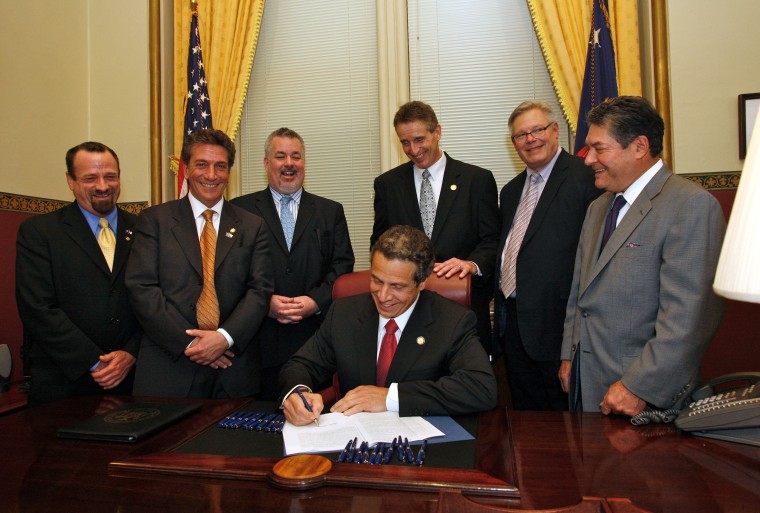
The New York Marriage Equality Act amended New York’s Domestic Relations Law to affirm that “no government treatment or legal status, effect, right, benefit, privilege, protection or responsibility relating to marriage shall differ based on the parties to the marriage being the same sex or a different sex.”
Quinn, who was in City Hill at the time trying to pass the city’s budget, remembers getting word during a press conference with Bloomberg. A staffer gestured wildly from the sidelines with a giant thumbs up.
“Oh God, as a New Yorker, it just made me so proud,” Quinn said, “and gratified that, finally, a discriminatory fact had been erased from the record. It meant a lot. It’s hard to hold your head up higher as a New Yorker, because we’re a pretty arrogant group, but I felt I could hold my head up higher.”
Ellner, who was in Albany as the vote was taken, said his only regret was not celebrating at the Stonewall Inn with the thousands of LGBTQ people and allies who had gathered there.
“It was kind of bittersweet to see it on CNN,” he said. “But, no, honestly, it was amazing.”
Banta stayed with O’Donnell in Albany that night, then the two returned to New York City the following morning. It was gay Pride weekend, and they marched in the parade with O’Donnell’s 5-year-old nephew.
“He told all his friends he was going to ‘Uncle Danny’s parade,’” O’Donnell said. “Literally, when the march would stop moving, people would chant my name on Fifth Avenue. But really, there was such a sense of euphoria — and relief.”
‘It felt miraculous’
The New York Marriage Equality Act took effect Sunday, July 24, 2011, and couples started getting married that same day.
One of them was Jonathan Thompson and Jonathan Polansky, who got married at the Queens courthouse in Forest Hills, after dating since 2002.
“We’d been together so long at that point that once the vote happened, we just sort of looked at each other and said, ‘So, we’re doing this, right?’” Thompson said.
It wasn’t a big romantic gesture, he said, but they were acutely aware of how monumental the moment was.
“It had been such a long push for marriage in New York, and we’d all been disappointed so many times before,” Thompson said. “When the bill actually passed — and during Pride Month, no less — it felt miraculous. There was just this communal feeling of emotion, and we just wanted to be a part of it.”
That wasn’t the only reason, though.
“If I’m being honest, I was also a little distrustful,” he said. “We wanted to do it right away, before anyone could take it away.”
The city had initially announced a lottery for the first day — Thompson and Polansky applied and won. Then officials decided to let everyone who had entered the lottery get a marriage license.
“So it ended up being a big, huge event,” Thompson said. “I remember it was extremely hot. We wanted to dress up, but it was stifling. So, we just went with business casual.”
It was a Sunday, when normally the courthouse would have been closed. But clerks and judges volunteered to work that day.
“Just to know that everyone there was rooting for us was a monumental thing,” Thompson said. “We took a number and sat in the waiting area, where we ran into some friends who were volunteers. Everyone there was talking to each other and taking pictures. It was definitely a sense of community and excitement.”
As a council member, Quinn didn’t have the power to perform ceremonies, but she was determined everything would go smoothly.
“My office, the speaker’s office, asserted itself into the full planning process,” she said. “I went to four of the five boroughs to congratulate and meet people who were getting married and also to thank the council staff that were there. I’ll never forget this one intern we had that summer. … He was holding up this huge sign that said, ‘This way to photos.’ Just the joy on his face and the joy of the people who were following him. I told him it looked like he was leading a parade.”
She recalled seeing City Clerk Mike McSweeney conducting the first ceremony in Manhattan, for Connie Kopelov, 85, and Phyllis Siegel, 76. The women had met in the mid-1980s volunteering with SAGE, an advocacy group for LGBTQ older adults.
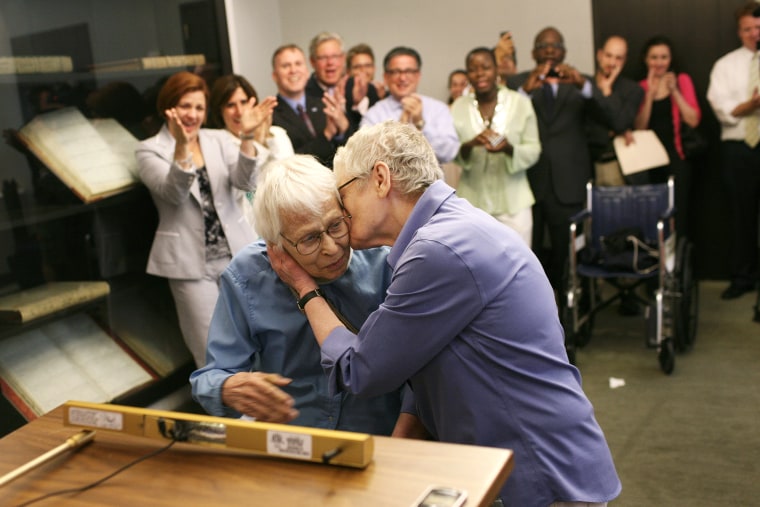
“It was magical,” Quinn said. “It was really, like, you couldn’t believe that a law, which on some level is just a piece of paper, could have such an impact. But it did — and it has.”
Everything had happened so fast that the offices of the city clerk hadn’t even had time to change its paperwork.
“The forms still had ‘man’ and ‘woman’ on it,” Thompson said. “It wasn’t embarrassing, though. It was amusing. It was nice. It was this feeling of, ‘We’re not gonna wait to fix it; let’s just get going, and we’ll all figure it out as we go.’ That was exciting.”
More than 800 couples registered to get married in New York City that first day alone, according to The Associated Press.
“People were booking flights to New York to get married,” O’Donnell said. “We didn’t have a residency requirement, so anybody could come here from anywhere in the world and get a marriage license and bring it back to where they’re from.”
‘Tremendous momentum’
For O’Donnell, the writing was now on the wall for federal marriage equality. Vermont, New Hampshire and the District of Columbia had already passed marriage laws legislatively, but New York was by far the largest state.
“Even in places like Mississippi or Alabama, at some point they were going to have a problem with the full faith and credit clause of the Constitution if they say, ‘We’ll accept straight marriages from New York but not gay ones.’” he said. “So it was coming.”
Ellner recalled “tremendous momentum” among activists coming out of the victory in New York.
“It felt like it was a matter of time,” he said. “It all shifted radically and so quickly. It was really the velocity that was surprising, but we felt, ‘As New York goes, so goes the nation.’”
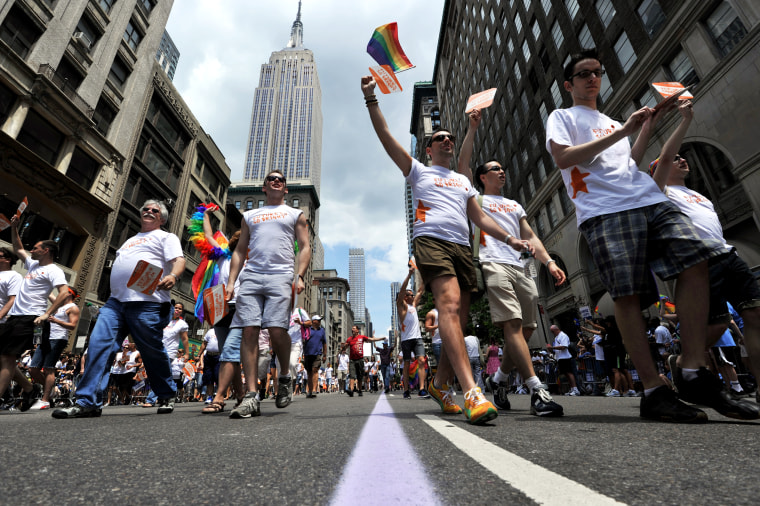
It wasn’t a bloodless victory, though: The four Republican state senators who crossed the aisle to support the bill all were out of office within the next few years.
In September 2012, Sen. Roy McDonald, who represented conservative Saratoga County, was defeated in a Republican primary by Kathy Marchione. During the race, Marchione questioned McDonald’s conservative bona fides, claiming he backed same-sex marriage to secure campaign donations.
“I could have found an easier way to get re-elected,” McDonald countered during a primary debate, insisting he supported the bill as “a human being that cared.”
“You get to the point where you evolve in your life where everything isn’t black and white, good and bad, and you try to do the right thing,” he told reporters. “You might not like that. You might be very cynical about that. Well, f— it, I don’t care what you think. I’m trying to do the right thing.”
But an undeniable tipping point had been reached: In 2012, Maine, Maryland and Washington all enacted same-sex marriage measures at the ballot, and, for the first time ever, the Democratic National Convention adopted a political platform endorsing same-sex marriage. That May, then-Vice President Joe Biden came out in favor of same-sex marriage, quickly followed by President Barack Obama.
The following year, a key part of the Defense of Marriage Act was struck down by the Supreme Court, and nine more states recognized same-sex marriage — five through legislation (Rhode Island, Delaware, Minnesota, Hawaii and Illinois).
“We showed that you could do it,” O’Donnell said of New York’s LGBTQ advocates. “I offered to help anybody out there who wanted to know how to do it, because it takes work. In the House, I flirted with some colleagues, I threatened others. I promised every single one of them if they voted ‘yes’ that I would invite them to my wedding, which I did — our wedding had 450 people at it. They all came.”
O’Donnell said he had toyed with getting married on that first day, but July 24 was Banta’s birthday, “and I didn’t need to be the first,” he said.
The pair married on Jan. 29, 2012, at Guastavino’s in Manhattan, with both Democratic and Republican legislators, the state comptroller, Lt. Gov. Robert Duffy and Cuomo all in attendance.
“If you’ve never thought you could get married, you never spend any time thinking about what your wedding would be,” O’Donnell said. “The two things that I wanted were a wedding cake and an actual honeymoon. So we had our wedding, we had our cake and then we went to Paris.”
